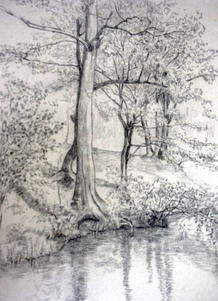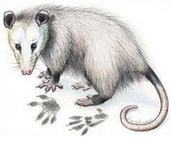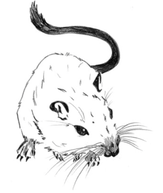 It makes sense that an ancient word meaning to cover would give us words like kerchief, garment, & garnish, but it takes a bit of imagination to connect an ancient verb meaning to cover to some of its other progeny. These days, the word garret conjures images of Paris, painters, & poets, but garret originally meant a turret or small watchtower — a place that might offer a spying soldier some cover. We also see this military sense of cover in the word garrison. And because we can’t have cover without having uncover, we have the word apperture, meaning an uncovering or opening. And apperture gave birth to something that might uncover one’s appetite, the aperitif, & to the opening to a musical event, the overture. And because we used to turn off the gas lights to signal the end of the night’s revelries, & doing so involved covering those flames, the word curfew was born of this same root meaning to cover. Want to be sure you’re covered when buying something? You can rely on your warranty, (also warrantee), or guarantee (also guaranty). Need a cover under which you might park your car? Try a garage. And they all come from one little Proto-Indo-European root. Linguists write it today as *wer-. This little root also managed to populate languages other than English. Sanskrit, Latin, German, Old Irish, Gothic, Old Persian, Old Church Slavonic, & Lithuanian all have words having to do with covering, all from this one little root, *wer-. Who woulda thunk? I'd love to hear which of these words offered the biggest surprise. Big thanks to this week’s sources: Merriam Webster, Lexico, Collins Dictionary, Wordnik, & Etymonline.
2 Comments
 In modern America it seems awfully easy to confuse what one wants with what one needs. And so… To want is to feel need, to crave. Want came to English in 1200 as a noun, meaning insufficiency, shortage, deficiency. Some near-synonyms include: To desire — to long for something with intensity or ardor. To wish for -- weaker than desire, sometimes referring to an unrealizable longing. To crave -- the strong desire to gratify a physical appetite or urgent need. To covet — to ardently desire. Though all the above words involve feeling a need, the need isn’t necessarily essential. I may want, desire, wish for, crave, or covet a $5000 guitar, but when it comes down to it, the three guitars I've already got are already taking good care of me. To need something is to experience an urgent requirement of something essential. Need appeared in English about the same time as want. It came from early Germanic sources originally meaning violence or force. Need broadened on its way from Old English to Middle English to mean distress, peril, hardship, necessity. Some near-synonyms include: To require -- to experience need of something that is indispensable to a particular end or goal. To lack -- to experience an absence or insufficiency of something essential. Dear readers, do you ever struggle with the delineation between want & need? Big thanks to this week’s sources: Merriam Webster, Etymonline, Collins Dictionary, Webster’s 1959 New World Dictionary of the American Language, & Wordnik.  The word kiss has been with English speakers since we were speaking Old English, except that it was spelled cyssan. Even back then it meant to touch with the lips. Though most etymologists are guessing kiss is a word imitative of the sound of a kiss, they haven’t landed on a common root for kiss. Still, these forms of the word exist in these languages: kysse — Norwegian & Danish kyssa — Old Norse kessa — Old Frisian kussian — Old Saxon cussen — Middle Dutch kyssa — Swedish kuwash-anzi — Hittite Interestingly, English is a language that gives us the same word for both a kiss of mild affection & an erotic kiss, whereas in Latin, an erotic kiss was called saviari, while a kiss of affection was known as osculum (which translates to little mouth). Might the saviari variety kiss — by comparison — involve a larger mouth? The idiom kiss & tell appeared in the 1690s. Kiss my arse has been around since at least 1705. Since 1825 a bit of chocolate or candy has been referred to as a kiss. Since 1911 the acronym SWAK has meant sealed with a kiss To kiss something goodbye appeared in 1935, as did to kiss someone off. Since 1937, we’ve had the term kiss-proof to refer to lipstick. Give me some sugar (a kiss) showed up in the 1940s. The kiss of death has been around since 1944. And we’ve got some kiss synonyms, with buss showing up in 1560, smack (a loud kiss) appearing in the 1600s, neck made its way to English as a verb meaning to kiss in 1825, & smooch arrived in 1932. This week, in lieu of leaving a comment, offer someone a kiss (your choice whether saviari or osculum). Big thanks to this week’s sources: Urban Dictionary, Merriam Webster, Etymonline, Collins Dictionary, & Wordnik.  Say these words aloud (really. It’ll be fun): bellows - belly - bilge - billow - bolster - bloat - bulge It’s easy to imagine these words all come from an ancient root meaning to swell. But wait, there’s more. Another branch of that same root gave us: ball - balloon - bole - bollocks - bull - bulk - boulder - bowl And another gave us: full - fool - follicle - folly At some point in history, that same root added the meaning to overflow, which gives you the opportunity to say another list aloud: fluid - flux - effluent - flume - confluence - influx - fluvial - influenza - reflux - mellifluous And it takes little imagination to reconstruct why these words all came from a root meaning to swell or overflow. Pretty swell, eh? If you’ve got swell comments, please leave them. And may your week be swell. Big thanks to Sioux Thompson for inspiring this post & to this week’s sources, Merriam Webster, Etymonline, Collins Dictionary, & Wordnik.  An ancient word for quiet led to a steaming heap of words — not all of them sounding all that quiet. Words in Old Persian,Old Church Slavonic, Avestan, & Old Norse led etymologists to construct the Proto-Indo-European word *kwyeə-, meaning to rest or be quiet. The big idea is that Proto-Indo-European was an unwritten mother-tongue that led these disparate groups to use similar-sounding words that all meant about the same thing. *Kwyeə- gave us the English word quiet in about 1300. A couple centuries later it also gave us acquiesce, quiescent & quietude. It also gave us a word roughly meaning super-quiet — the word requiem. Apparently being free & clear gives one a sense of quiet, so those who were free & clear of debt, discharged, at liberty, or unmarried, were said in the 1200s to be quit. Hmmm. A legal form of being free & clear is to be acquitted. In time, the freeing sense of quit took over in popular usage: to release, let go or abandon. This free & clear meaning also gave birth to the word quite, (someone who is quite intelligent could also be labelled clearly intelligent). And because getting some rest & quiet takes a little time, *kwyeə- also gave us the words while & awhile. Last but not least, *kwyeə- gave us the word coy. Coy’s original meaning (in the 1300s), was quiet. It only took a hundred years for its meaning to ooze from quiet through placid & gentle to shy & bashful. All that from quiet. Any thoughts? Please let me know in the comments section. Big thanks to Sioux Thompson for inspiring this post & to this week’s sources, Merriam Webster, Collins Dictionary, Etymonline, Oxford Dictionaries, & Wordnik.  The word stream, a course of water, came to Old English from Germanic languages. Its Proto-Indo-European root meant to flow. Another Proto-Indo-European root meaning to flow gave us the word runnel, a small stream. But wait…there are more! The word creek most likely came from an Old Norse word meaning corner or nook. Etymologists believe the word is related to the word crook, originally meaning full of bends & turns. By the 1500s, creek (also pronounced crick) came to mean a small stream or brook. An Old Norse word meaning stream gave Middle English speakers the word beck. Interestingly, these days we use beck to refer to streams that flow ruggedly over gravel and stones — as many northern European streams do. Most modern English speakers would label a contest of speed with the word race. This meaning kicked in about 1510. Previous to that, race meant the act of running. Race came from an Old Norse word meaning a rush of water, & that meaning has hung around all these years, which is why in some regions, a stream or creek is referred to as a race. The word brook, a stream or creek, came to Middle English from an Old English word meaning to use or enjoy. A stream can also be called a rindle, which came into Old English from Germanic sources used to refer to a brook, stream, runner, or messenger. About 1300 the word branch appeared in English, meaning division of a stem of a tree or bush. Branch’s meaning almost immediately broadened to mean division or contributing member of anything, including a river or stream. So as long as it merges downstream with another creek or river we can call a creek a branch. Some English speakers refer to a stream as a burn. This words comes from an Anglo-Saxon word that meant brook or stream, & is the reason many towns or cities near streams end in something like burn, for instance Melbourne, Gisborne, & Blackburn. A rill is a small brook or stream. This word came to English in the 1530s from one of the Germanic languages, likely coming from a Proto-Indo European word meaning to run or flow. And last but not least, Northeastern Americans got the word kill (meaning stream), from a Dutch word meaning riverbed or channel, which is why so many streams and creeks in Pennsylvania, New York, & New Jersey are referred to as kills. I’d love to know which of these surprised you. Comment away. Big thanks to Sioux Thompson for inspiring this post & to this week’s sources, Merriam Webster, Collins Dictionary, Etymonline, Say Why Do I?, Oxford Dictionaries, & Wordnik.  Here are some more Algonquian words that made their way into English. An Algonquian word meaning powder, dust, or ashes came to English in 1896 meaning worthless. That word is punk. Though the West Indian island Jamaica got its name from the Taino-speaking folks who lived there, the Jamaica of Jamaica Plains in New York is Algonquian. It comes from the Delaware branch of Algonquian & meant beaver pond. In 1937, United States Rubber Products Inc. trademarked the name Naugahyde, a word that patched together the Old English word hide with Naugatuk, the name of the Connecticut town in which the product was made. Naugatuk is an Algonquian word which meant one tree. An Algonquian village near a Connecticut river was situated in a boggy place, so the natives called it Potunck (which meant something like to sink in). In 1846, the word Podunk was born — the name of a mythical & “typical” town featured in a recurring column in the Buffalo Daily National Pilot newspaper. Years later, the meaning oozed toward meaning an insignificant, isolated place. Since 1763, English speakers have used the word caucus — a private meeting of leaders or voters. Though the research isn’t definitive, caucus’s source is most likely an Algonquian word meaning counselor, elder, or advisor. Some Algonquian speakers were impressed by the size of the canoes of another native group (the Chiwere), & called them people of the big canoes. Their name for this group turned into the word Missouri. Though etymologists are still arguing about the origin of the word tuxedo, one of the likely sources is Algonquian. They called a Delaware town P’tuck-sepo, after its crooked river. That town name got applied to Tuxedo Park, New York, which became a “rural resort for wealthy New Yorkers,” & the attire worn by the visiting gentlemen likely picked up the name, tuxedo. Modern English speakers have a richer language thanks to hundreds of contributing languages, including all the various branches of Algonquian. Though English has benefitted from them, not all those languages have survived. It seems to me we should be appreciating them all the more. My thanks go out to this week’s sources, Merriam Webster, Collins Dictionary, Etymonline, & Wordnik.  English-speaking settlers on the continent learned a bunch from Algonquian-speaking inhabitants, & this learning didn’t stop centuries ago. Here are a few of the Algonquian words that have become part of English. In 1610, the word opossum (or simply possum) came to English from the Powhatan branch of Algonquian. The original word translates to white dog. The Mikmak branch of Algonqiuan gave us the word caribou in the 1660s. The original word translates to pawer or scratcher, due to the caribou’s habit of pawing through the snow to find edible moss and grass. Just south of Boston is the Great Blue Hill. Before Europeans muscled into the area, an Algonquian-speaking group of people lived there. Their native neighbors referred to them as the people at the large hill, or Massachusetts. Though the people at the large hill sadly no longer exist, the name remains. In the 1670s, English speakers started using the word woodchuck, which comes from the Cree branch of Algonquian & originally referred to the marten, a rodent inclined to live in forests. The Cree word was otchek, but because martens lived in trees, European settlers heard something closer to woodcheck, thus ending up with woodchuck. Most branches of Algonquian had a word meaning shoe, which sounded something like mocassin. In 1610, English speakers started using the word to refer to a soft leather shoe lacking a stiff sole. An inland group of Algonquian speakers labeled a particular hunk of land the place of the wild onion — which sounded something like shekakoheki. In 1833, English speakers learned this word from the French trappers in the area, & made use of it to name that area Chicago. In 1629, an Algonquian word meaning that which is ground or beaten made its way into English to refer to parched corn — so we have the word hominy. We all know the famed location of Orville & Wilbur Wright’s first flight is Kitty Hawk, but the place name had nothing to do with cats, kitties, or raptors — it’s a brutally Anglicized version of the Algonquian place name, which first occurred on English maps as Chickehawk. Nobody’s certain what the original Algonquian name was, or what it meant. Historically, English speakers showed little respect to the many speakers of the various branches of Algonquian. Perhaps we can show a bit of respect now by (at the very least) recognizing the source of some of our English words. My thanks go out to this week’s sources, Merriam Webster, Carolina Designs, Collins Dictionary, Etymonline, & Wordnik.  A sizable number of English words come either from or through Arabic. Here’s a tiny sampling. In the 1660s, English speakers started using the word yarbuah, which referred to a mouselike rodent of Africa & Asia Minor, called exactly that in Arabic. But in 1849, yarbuah was eclipsed by a version of yarbuah that travelled through Latin & French on its way to English, but still came from the original Arabic word. Thus, we have gerbil. In the 1670s alcove (a vaulted recess) made its way to English from Arabic through Spanish & French. Demi-tasse (a small cup of black coffee or the cup in which it is served) came to English from Arabic through French in 1842. Our English word ghoul comes from an Arabic word meaning evil spirit that robs graves & feeds on corpses. Ghoul showed up in English in 1786. The first two syllables of Guadalcanal come from an Arabic word meaning river. Guadalcanal first appeared in English in 1568. The first two syllables of Guadalupe came from the same Arabic source in the same year. In about 1600, English speakers began using the word henna, which came from the Arabic word hinna, the name of the small thorny tree from which henna dye is extracted. In 1600 the originally Arabic word gazelle arrived in English after a linguistic tour through North Africa, Spain, and France. Tarragon arrived in English in the 1600s. Though it started out as a Greek word, it came to English through Arabic. The originally Latin word tuna spent a bunch of time in Arabic & Spanish before making its way into English in 1881. And in other tuna news, the word albacore came through Portuguese from an Arabic word that translates literally to milk-cow (due to the albacore’s substantive size). The word sofa showed up in English in the 1620s from Arabic through Turkish. Were any of these words a surprise? I’d love to hear from you. My thanks go out to this week’s sources, Merriam Webster, Collins Dictionary, Etymonline, & Wordnik.  Hindi, which is spoken in India & many other places, has given English speakers some great words. The word loot arrived in English in 1849 from a Hindi word meaning booty or stolen property. Hindi speakers got this word from Sanskrit. In HIndi, a payndit is a learned master or teacher. By the 1670s, this word oozed into English as pundit, a person who offers opinions in an authoritative manner. Pajamas (& pyjamas) came to English in 1800 from a Hindi word meaning loose trousers tied at the waist. Pajamas came to Hindi from a Persian word meaning leg clothing. In 1851 bloke arrived in English. Etymologists haven’t nailed down its source, but the two frontrunners are a Celtic word meaning a large, stubborn person, & a Hindi word meaning a man. Hindi speakers got the word kamarband from Persian, which by 1610 made its way to English as cummerbund, a loose sash worn as a belt. Bandana made its way to English in 1752 from a Hindi word referring to a method of dyeing. This word came from a Sanskrit word meaning bind — perhaps the method of dyeing in question was something like our modern tie-dye. In 1859 the word nark or narc came to English — an informer, not from narcotics. Its most likely source is a Romany word which came from a Hindi word meaning nose. The punch that refers to a type of mixed drink appears to have come from the Hindi word for the number five — reportedly the number of ingredients in the first punch. This particular meaning of punch came to English in the 1630s. The word cot, a small, light, bed, first appeared in English in the 1630s from a Hindi word meaning couch or hammock. In 1915, the Hindi word meaning pleasant, happy, & healthy, gave us the word cushy. Interestingly, it has no relationship to the word cushion. We English speakers owe a thank you note to the Hindi-speaking world. For which of these words do you feel most grateful? My thanks go out to this week’s sources, Merriam Webster, Collins Dictionary, Etymonline, & Wordnik. |
I write for teens & tweens, bake bread, play music, and ponder the wonder of words in a foggy little town on California's central coast.
To receive weekly reminders of new Wordmonger posts, click on "Contact" & send me your email address. Archives
November 2023
|


 RSS Feed
RSS Feed